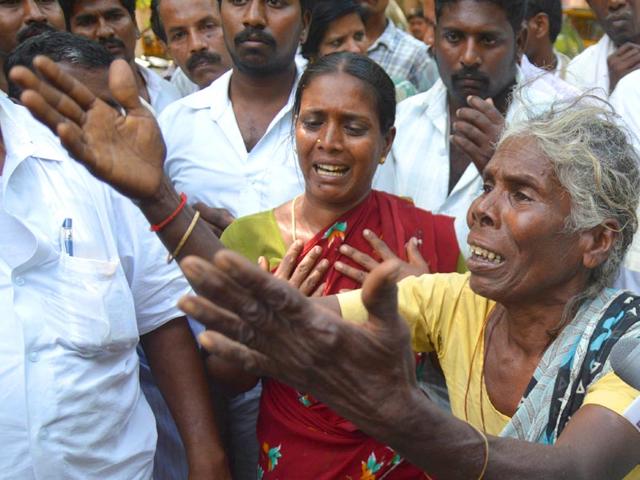The woods are lovely, dark — and dangerous
The killing of 20 woodcutters inside the red sanders-rich Seshachalam Hills in Chittoor last week was not a one-off episode. Clashes between forest protection forces and tribals over forest resources, especially the commercially lucrative ones, take place often in India’s forests.
The killing of 20 woodcutters inside the red sanders-rich Seshachalam Hills in Chittoor last week was not a one-off episode. Clashes between forest protection forces and tribals over forest resources, especially the commercially lucrative ones, take place often in India’s forests.

Like in Akira Kurosawa’s Rashomon, the various characters involved in the Chittoor incident have given contradictory versions of the incident. According to the Red Sanders Anti-Smuggling Task Force (RSASTF), “red sanders smugglers” attacked its men when they were caught felling the trees.
The red sanders tree, the only one tree species that gets ‘gun cover’ in India, is in great demand in South East Asia, China and Japan. A ‘survivor’ has given a different version of the incident. Rights activists have questioned the RSASTF’s version and demanded an “independent enquiry” into the killings of poor, landless “woodcutters”.
India has forest coverage of 23% and more than 200 million live in and around these forests and depend on them for their life, livelihood and cultural identity. But under the banner (some call it “guise”) of scientific management of forests, the intended objectives of our forest policies has been to “maximise profits” by sale of forest products and discouraging forest dwellers from “exploiting” forest resources. To do so, some trees like red sanders have been ‘nationalised’. This legal appropriation of forests has led to the ‘criminalisation’ of normal livelihood activities of forest-dependent people, making them ‘encroachers’.
Here is what ‘nationalisation’ of trees means: It means that you may own the land but the economic benefit of harvesting ‘nationalised’ trees would always be with the State. In other words, the State reserves the right to sell the tree. That is not all: A farmer has to inform the forest authorities if he has such trees on his land and also care for them. If there is a theft or a tree dies, he is expected to report the matter to the department. And when the government decides to cut the tree, the farmer gets 75% of a price determined by the forest department, which is not as high as the prevailing market price. The disbursal process is also time-consuming. However, nationalised trees inside forests are the sole property of the State.
Such lopsided laws, coupled with lack employment opportunities and skills, force the forest-dependent communities to work for smuggling gangs/poachers or join insurgent groups as has happened in Chhattisgargh and other areas. “Red sanders is not widely available. Since there is a supply-demand mismatch, it is fetches such high price in the international market and makes it lucrative for illegal loggers. One way of fixing this imbalance would be grow it in different areas,” a senior forest officer, who did not wish to be identified, told me. “We also need to mainstream tribals and most importantly, ensure that they get a good part of the actual proceeds from the sale of such nationalised trees”.
Over the years, strident opposition to such lopsided forest laws that were pushing people to smuggling or insurgency led to the formulation of the Scheduled Tribes and Other Traditional Forest Dwellers Act (FRA) in 2006. The FRA recognised the land rights of forest-dwelling populations and replaced the forest official as the sole arbiter of forest land. It requires that the individual and community rights of the people living in forest areas be settled and their consent taken before considering the diversion of forest land.
Unfortunately, the NDA is now keen to dilute this law, doing away with the legal need for consent of tribal communities while handing over their forest land to industry. This will leave the power to give away forest land with officials and politicians at the Centre or states. The dilution is certain to alienate forest communities further and push them towards illegal activities. And incidents like Chittoor will continue to make news on a regular basis.





